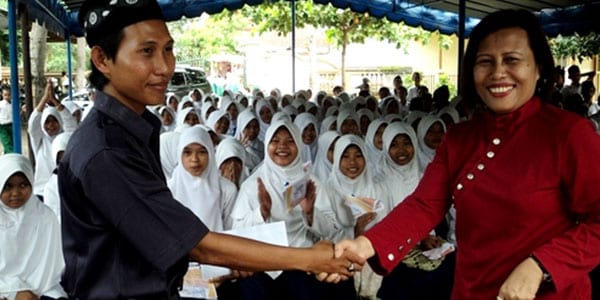Meet some of the women we’ve helped in Indonesia

APIK work throughout West Nusa Tenggara (NTB) province in Lombok. They partnered with Oxfam in 2002 when they operated from a garage with only 3 staff. In this time it has developed from a small provincial NGO to become the pre-eminent women’s rights NGO in NTB and leading organisation providing support for all other gender justice organisations in Indonesia.
Saving HS and NN
Oxfam’s support enables APIK to train paralegal workers. In one year, 45 newly trainied paralegal workers handled 351 cases – cases that are protecting victims of domestic violence and human trafficking and standing up for migrant workers’ and children’s rights.
HS and NN are two 17 year old girls from West Java. Poverty pushes many women to try their luck in bigger cities where there are more chances of finding work. Both girls were recruited by a woman called Hosi to work in a restaurant with the promise of a monthly salary of NZ$4-500. They went with Hosi to Lombok and were taken directly to a café in the tourist area of Senggigi.
Broken promise
What they experienced next was far removed from what was promised them.
They were forced into short and revealing clothing and faced a barrage of constant verbal and physical sexual harassment from drunken customers. Both girls were raped. They were filled with anger, fear and disappointment. They lost hope. HS summed up their situation: “Nasi sudah jadi bubur”, which means ‘the rice has turned to porridge’, an old proverb meaning a condition cannot be changed.
Hosi told them to accept their conditions. But the girls saw their opportunity to escape and used a visit to a beauty parlour as an excuse. They ran for it but were chased by the café customers so hid in a nearby hotel. A security guard helped them make the last stretch to the police station where they filed a report.
APIK steps in
The girls were placed into temporary accommodation and the head detective contacted APIK to assist their investigation. APIK searched the café where the girls had been exploited to gather evidence for prosecuting the café owners. They were able to send the two girls back to the safety of their families, but the girls were still threatened over the phone by their abusers. APIK fought to have them protected by the national Institute of Witness and Victim Protection body.
APIK used the media to highlight the girls’ plight and sent a joint letter written with the Office of Women and Child Empowerment to provincial police and national police HQ, pressuring them to finish the police investigation and report into the case. Once the police finished their report, Hosi and another of the perpetrators were arrested and charged with human trafficking.
Justice for Anjay
Anjay* worked as a housekeeper, but was being raped and subjected to psychological abuse by her employer for six years.
The police and prosecutor initially dismissed the case on the grounds of insufficient evidence. But APIK pressured for a trial in the District Court and presented evidence of psychiatric damage. Despite this, the District Court ruled the defendant not guilty.
APIK urged the public prosecutor to appeal. The High Court ruled the defendant guilty and convicted him to five years in prison. This is the first case in Indonesia where a domestic helper was able to find justice using domestic violence law.
*We’ve changed the name to protect her identity.
 A new life for Genik
A new life for Genik
We’re also helping women like Genik, who would otherwise face the threat of impoverishment, to rebuild their lives and economic independence. Genik is 39 years old and lives in Saba Village in Central Lombok.
“My husband abandoned me for a younger wife and left me with nothing. I had no money to look after our children. APIK worked hard to help me get an alimony payment from my husband. They also gave me a small grant that I used to buy ducks. I’ve been breeding ducks and selling cooked, salted eggs. I’m now raising several goats as well and I can afford to send my daughter to college.” Genik (39) from Saba Village in Central Lombok.
Support this vital work
Beauty Erawati is the Director of APIK and a leading human rights lawyer. Successes like these give Beauty and her team the drive they need to continue with their difficult work. But a lack of funds is a big problem for APIK – it means they find it difficult to enforce the local laws and regulations that protect women.
Oxfam is currently the only organisation that funds APIK’s legal training scheme, which to operate at the current level requires a minimum of $85k per year.
Beauty thanked Oxfam’s supporters “from the bottom of my heart because your support means hundreds of women across Indonesia have received justice, protection and the right to live their lives as they choose.”
$45 today could help one woman to take her traffickers to court





